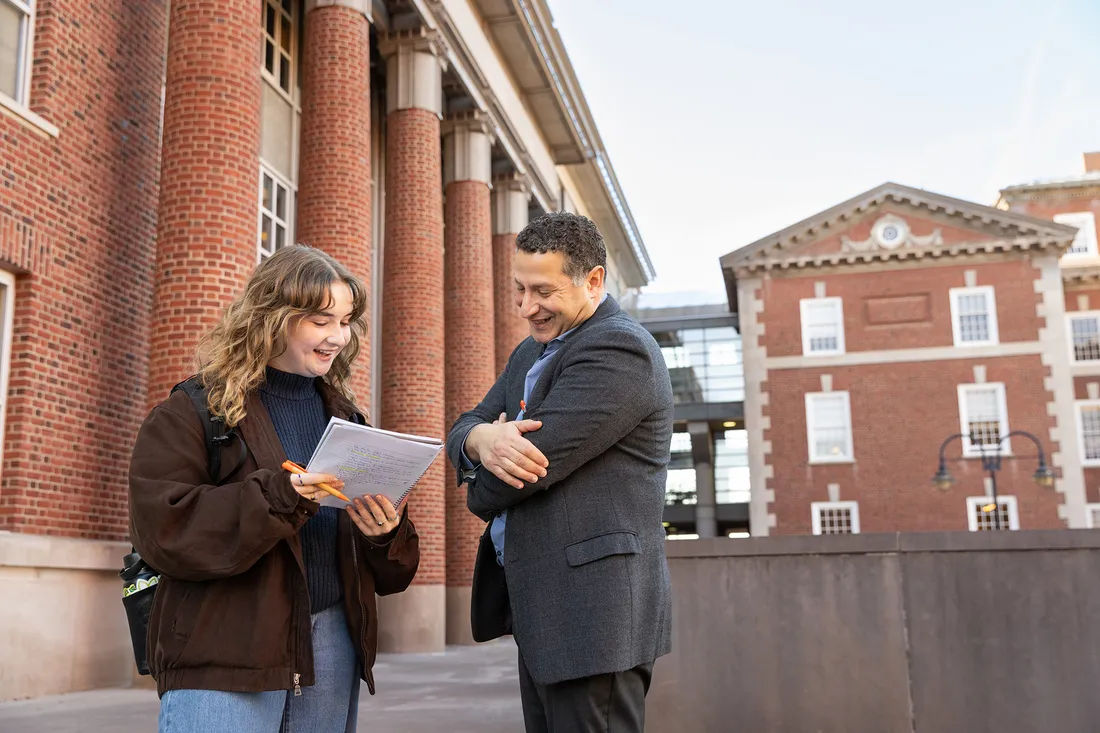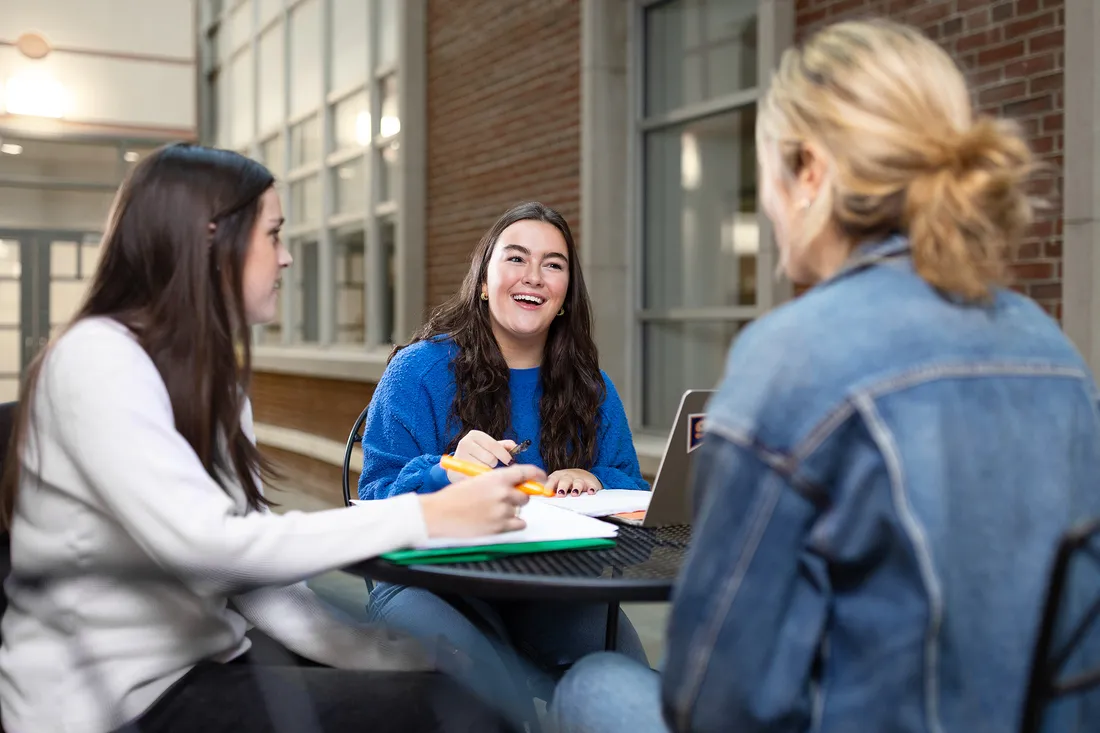At Syracuse University, first-year students can join a living learning community (LLC) and live with peers who share an academic major or interest. The University features more than 30 LLCs, which range from architecture, design and esports to exercise science, leadership, LGBTQ+ and STEM. There are also LLCs for sophomores and upper-class students. Syracuse’s LLC program—which is recognized among the top learning communities nationwide by U.S. News & World Report’s Best Colleges—focuses on helping students make a successful transition to college life and providing unique opportunities. The LLCs create community among their members and offer academic guidance and team-building social events as well as peer mentoring and interaction with faculty members.
We reached out to students who’ve been involved with LLCs as residents and leaders and asked them to share insights on their experiences and advice for potential LLC residents. Here’s some of the advice they had:
Embrace Support To Reach Your Goals

As a peer mentor in the College of Engineering and Computer Science (ECS) Living Learning Community (LLC), Oliver Raycroft ’25 (standing) provides academic support, offers guidance and helps ECS LLC residents navigate University systems.
Whether you’re in an LLC where its members have similar majors, interests or cultural identity, each LLC offers students support to reach their ultimate goals for their future.
As a peer mentor for the College of Engineering and Computer Science (ECS) LLC, Oliver Raycroft ’25, an environmental engineering major who was a first-year ECS LLC resident, sees his main role as helping LLC students make the transition to college by sharing advice and providing support for their academics. However, as he says, “being a student at college is far from just attending classes and doing homework.” For example, along with holding weekly meetings where he offers guidance and fields questions about the University, he hosts workshops, helping students navigate course registration, MySlice, Blackboard and other University systems.
Raycroft says there’s a “huge advantage” to living in the same residence hall as the peers you share classes with. “My biggest piece of advice is to attend events,” he says. “There are so many resources offered to LLC students that many other students don’t get access to. Take advantage of what’s being offered to you even if you aren’t sure how it could help you right now.”

Nicole Karadimitriou ’26 enjoyed her time as a first-year Honors LLC resident in Sadler Hall. “I was thrilled to meet people from all majors,” says Karadimitriou, a Whitman School of Management student.
Nicole Karadimitriou ’26—a triple major in retail management, supply chain management, and entrepreneurship and emerging enterprises who was a first-year Honors LLC resident—supports these insights. When applying for an LLC, she was torn between the Honors and Whitman Leadership LLCs. She liked the idea of living with classmates who shared similar interests and goals and getting to know them in a more casual setting, but she also was attracted to the idea of being around students who represented a diverse range of interests and majors. She eventually determined the Honors LLC was the right choice for her.
“I recommend taking time to reflect and consider how different LLCs align with your personal and academic goals,” she says. “Be prepared for a more immersive college experience that extends beyond the classroom—it’s about forming connections and creating lasting memories.”
Discover Commonalities and Build Relationships
At their core, LLCs provide students with a community of like-minded individuals. For Trisha Balani ’27, a Leadership LLC resident advisor (RA) and former Honors LLC resident, interaction is key to being a member of an LLC community.

Leadership LLC resident advisor Trisha Balani ’27 (center) has fun bowling at a Leadership/MORE in Leadership LLC event at Apex Entertainment in Destiny USA mall earlier this fall. She emphasizes the importance of interacting with LLC community members.
Since students likely share similar reasons for choosing a specific LLC, it’s important to “take advantage of those commonalities,” says the policy studies and applied data analytics major. “They can lead to some amazing relationships and even academic or extracurricular activities.”
Balani incorporates this philosophy into her RA work by hosting events such as an LLC dinner and mocktail night. Reflecting on her time in the Honors LLC, Balani cites how she was motivated by peers who were social, involved and committed to success. “For me, it is important to be surrounded by people who have similar priorities, because that helps me hold myself accountable for my success,” she says.

Design LLC peer mentor Avi Berzofsky ’27 (right) likes to help Design LLC residents create their own experiences and values LLCs as a way to forge friendships and support one another.
Design studies major Avi Berzofsky ’27—a former Design LLC resident and current peer mentor for the LLC—believes strongly in community building. As a peer mentor, he uses a relatable approach to help students adjust to college life. He holds weekly meetings, hosts workshops and provides guidance on studying skills and University procedures, drawing on his knowledge and experiences to help mentees create their own experiences.
“LLCs are the best way for first-year students to get to know their classmates for the next four years, depending on their major,” he says. “You get to see different creative processes, support one another with assignments and most importantly make friends quickly and easily.”
Learn from Peers and Faculty Mentors
Many students in LLCs not only learn from faculty members, but they also have the opportunity to learn from each other. Megan Edenfeld ’25, a former International Relations (IR) LLC resident, notes that LLC students who share a passion can learn from their peers’ experiences and perspectives. Like many first-year students, the international relations and economics major recalls not being confident in preparing for college exams. She credits her IR LLC peer mentor for introducing her to study strategies that have contributed to her academic success.

International Relations LLC peer mentor Megan Edenfeld ’25 (left) meets with Professor Osamah Khalil, chair of the International Relations Undergraduate Program. Khalil helped Edenfeld work out the details for an internship with the U.S. Department of State, and she encourages LLC residents to develop connections with faculty members affiliated with their LLCs.
Now, in her third year as an IR LLC peer mentor, Edenfeld shares those skills and insights with her mentees. “I provide guidance on almost anything a first-year student might need,” she says. “Peer mentoring is an important part of the LLC experience because it provides first-year students with a sense of safety and reassurance that they will find their place at SU.”

Honors LLC peer mentor Isaac Chin ’27 (right) embraces his role of helping LLC residents and making them feel like part of a community. “In the vast world that is Syracuse University, it may be hard to find like-mind people gathered in one location,” he says. “But the LLCs do just that.”
Architecture major Isaac Chin ’27—a former Honors LLC resident who’s now a peer mentor for the LLC—likes to “keep things chill” and create a fun environment for the students he mentors. He offers workshops and reaches out through floor hours and door dialogues. “I check on each resident individually to see how they’re doing,” he says. “It also provides them with an opportunity to talk one-on-one with me about any concerns they may have.” As a mentor, he realizes a friendly, casual conversation can help a student acclimate and feel part of the community.
For Edenfeld, the best part of being in an LLC was the opportunity to develop connections with faculty. As a sophomore, she was offered an internship at the U.S. Department of State in Washington, D.C., but as a full-time student she didn’t think she’d be able to take advantage of it. Seeking advice, she reached out to history professor Osamah Khalil, the chair of the IR Undergraduate Program whom she’d met at an LLC luncheon the previous year, and he helped her work out the internship. “Without Dr. Khalil, I would not have been able to pursue such an incredible opportunity,” she says, “and without that experience, I do not think I would be where I am today.”



